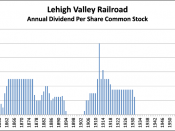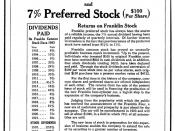The dividend decision is an integral part of the firm's strategic financing decision. It essentially involves a firm's directors deciding how much of the firm's earnings, after interest and taxes (EAIT), should be distributed to the firm's ordinary shareholders in return for their investment in the firm, and how much should be retained to finance future growth and development. (Sterk and Vandenberg 2004 441-55)The objective of the firm's dividend decision, like all financial decisions, should be the maximisation of shareholder wealth. If an optimal dividend policy does exist then clearly managers should concern themselves with its determination; if it does not, then any dividend policy will do, as one policy will be equal to another. It should be noted that the dividend decision and dividend policy relate only to ordinary share capital. (Asquith and Mullins 2003 77-96)The payment of preference share dividends is not considered part of a firm's dividend policy, as the level of, or method of calculating, the preference dividend is fixed in advance by the terms and conditions of the original preference share offer.
Once a dividend policy has been formulated, setting out the amount and timing, etc. of dividend payments, it should be followed with stability and consistency as its guiding principles. As we shall discuss later, changes to a firm's dividend policy can be interpreted in various ways by the financial markets, sometimes with dramatic consequences for the firm's share price. You will note that the dividend decision is made at the level of the firm's most senior managers - at board of director level. It is the directors who will decide the amount and timing of dividend payments. Under UK company law the directors cannot be compelled to recommend a dividend and shareholders cannot vote themselves a higher dividend than that recommended by the...


